Talk for five minutes with Bruce Weitzman—owner of Wethersfield, Conn.-based Pelton’s Home Health Care—and you can’t miss his reverence for his home medical equipment company’s history and his predecessors’ care for their clientele, the foundation on which he continues to build. It’s a long and illustrious history woven over two centuries, and threaded with visits by six presidents and vice presidents, keen entrepreneurship, change and tragedy. Through it all, there has been one constant.
“The key thing has always been to make sure customers were taken care of very well,” Weitzman says, “and that’s very important to me now. I am taking care of people for as long as they need me.”
Weitzman feels the weight of that mantle woven more than 200 years ago when S.S. Southmayd opened a store on Main Street in Middletown, Conn., then a bustling seaport town on the Connecticut River. He dealt in medicinal oils and medicines that came from the Caribbean Islands and Europe, as well as offering other wares.
The company survived the War of 1812, though the sea trade did not. The store would be acquired in 1871 by one of its former clerks, a Civil War veteran by the name of Charles Abner Pelton, who chose to rebrand the company in his own name.
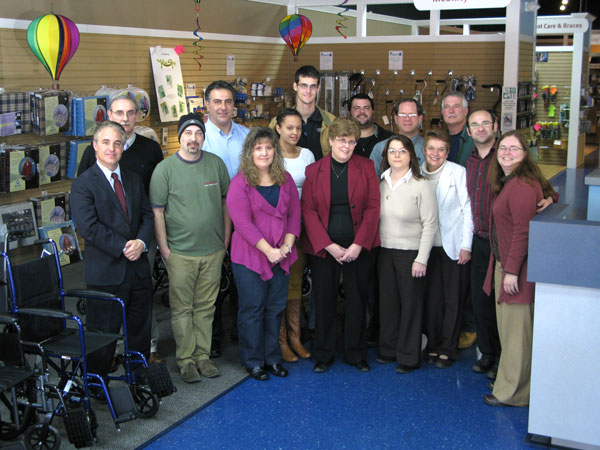
The Weitzman Years
In 1928, the store passed into the hands of the Weitzman family. After apprenticing under Pelton for approximately three years, Ben Weitzman, grandfather of Bruce, purchased the store, retaining the name. Pelton’s was dispensing prescriptions, farm supplies and basic drugstore items then, but Weitzman, recognizing the needs of his customers, broadened the scope. He added housewares, greeting cards, newspapers and candy. In fact, local folklore has it that candy manufacturer Russell Stover delivered some of its first candies to Pelton’s.
After graduating from the University of Connecticut’s School of Pharmacy in 1960, Jerry Weitzman joined his father in the business, which by then had swelled to a small chain of drugstores. In 1972 he purchased the chain from his father, built a new facility in Middletown and instituted a full-service home medical equipment center, as well as a post office. By 1999, Pelton’s had locations throughout the state. The 1,000 square-foot Southmayd Company had blossomed into a 30,000 square-foot store with 170 employees.
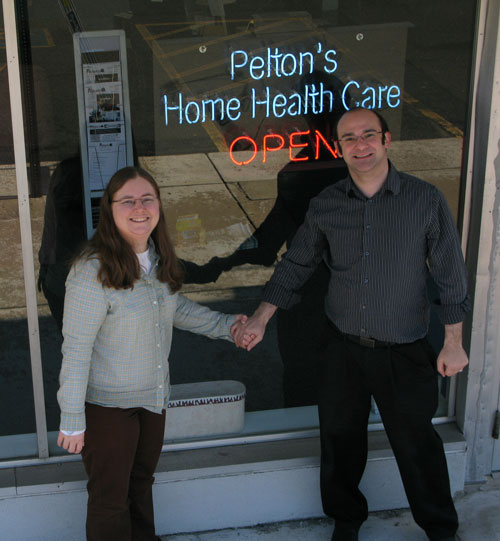
One of those employees was Bruce Weitzman, Jerry’s son. “I grew up with the business, and I grew up around retail, and I grew up around the pharmacy and HME and DME,” he says, recalling that he used to stand behind the pharmacy bench counting pills with his dad. “It’s a thing I absorbed growing up. It taught me a lot about following instructions.”
It also taught him a lot about caring for people. At that time Pelton’s was run largely by an executive staff, each of whom had a particular area of responsibility—HME, pharmacy, gifts. “It had that personal touch,” Weitzman recalls. “We were able to give Pelton’s this personal feeling you don’t get from a big-box store. It’s a place where you would know who was in charge of gifts and you could tell that person you were looking for something special and they would special order it for you. It was a place where you could talk to people in charge and get somewhere.”
Still, Bruce Weitzman had no plans to go into the family business. Instead, he was on his way to the Rochester Institute of Technology. Then in 1999, two weeks before he was to graduate from high school, everything changed. Jerry and his wife and two friends were on their way to a baseball game when their car was hit head-on by a drunk driver. All four were killed. After the estate was settled, the pharmacy was sold. The company had relocated from Middletown to Wethersfield in the 1980s and its two locations there were consolidated. Weitzman took over running the operation from family members in 2009 and concentrated on home health care.
The company carries just about everything associated with HME, excluding respiratory and high-end rehab. It has a strong business in modular ramps, stair lifts, retail and home care. “We have a huge showroom, 7,000-plus square feet,” Weitzman says proudly. “It’s kind of like an HME superstore, where you have everything and stock everything. It’s been a big drawing card. The big-box stores actually send people our way because they can’t help them.”
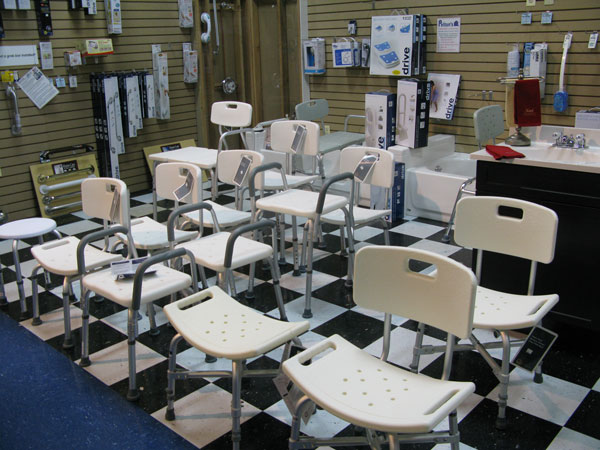
At Pelton’s, people can get what they need. “I tell people, if you have a project and want to get something done, call me. I’ll get it done. If you need something, whether it is a ramp or something that you have no idea how to do or get, I will help put people together who will provide whatever you need. It goes back to that personal touch, that’s what we have here.”
“Whatever you need” could mean working with a general contractor on a home modification or fixing a walker or finding an aid to daily living that would enhance one’s life at home.
Indeed, Pelton’s motto these days is “Welcome Home.” It’s proclaimed on a huge sign inside the store and is used in the company’s advertising. Even after 200 years, Pelton’s advertises. Weitzman said he recently had occasion to look back at the company’s advertising from the 1950s and ’60s and discovered it routinely featured wheelchairs and canes in its holiday specials.
These days Weitzman’s wife, Loucindy, handles the advertising and tracks how sales change depending on which type of medium is used. “We do newspaper and radio—radio seems to work well,” Weitzman says, noting that Pelton’s also produces a quarterly newsletter, which it sends out to clients via e-mail and also makes available in the store. One of its most popular features is the coupons that appear in the newsletter.
“In bigger-ticket items, it helps people make it over the price hill,” he says. “Like in the case of a cushion lift. If it is $799 originally, and now it’s $699 with the coupon, you feel like you can handle that a little more easily.”
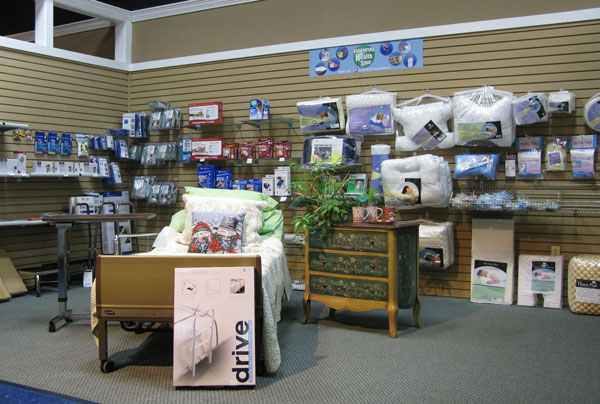
Into the Future
While Pelton’s does bill Medicare and bid in Round 2 of competitive bidding—hospital beds and wheelchairs—Weitzman says his focus is on growing his retail and stairlift departments.
“Cash sales is definitely where we would like to go,” he says, noting that Pelton’s has opened a separate company, Omni DME, that is Web-based and doesn’t have a Medicare number. It is not “super-active,” Weitzman admits, but he’s working on building it up.
If he doesn’t win a Medicare contract in Round 2, Weitzman says that Pelton’s will either find a new market or expand a current market to make up the difference. He doesn’t see competitive bidding as his biggest challenge. “The biggest challenge is to make sure that the customer gets what they need as best as we can get it for them.
There are a lot of really great products that will make people feel a lot better. But the way insurance is set up, the way that the industry works, if you don’t have a lot of money, if you can’t pay cash, then you don’t get the latest technology. Insurance doesn’t let us provide things that people need.”
For example, he says that a young girl who was a client of Pelton’s was suffering from skin breakdown because the tape that her insurance paid for caused her skin to come off. Pelton’s saw to it that she got what she needed, but because of cost, “we can’t do that for everyone,” Weitzman explains.
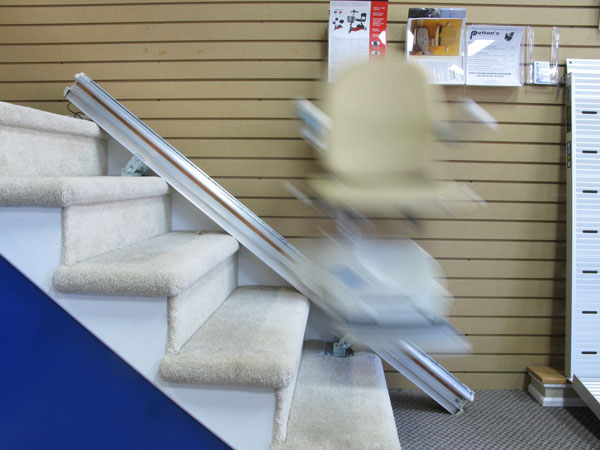
Situations like that go against what Pelton’s is all about, and has been all about since 1800, as he sees it. Still, Pelton’s will continue providing what fits the customer’s needs. “I see Pelton’s in the future, and for the next 100 years, being what we always have been,” Weitzman says, referring to the company’s history of customer care. Its stock in trade could change, however.
“We haven’t always been HME or DME, and we haven’t always been a pharmacy. As the industry changes, I think we, and everybody, are going to have to change. Change is a way of life.”
It’s been that way at Pelton’s for almost 213 years, and that’s something that isn’t likely to change. By offering a broad line of products and services, remaining true to its commitment to excellent customer service, and maintaining a spirit of adaptibility, Pelton’s is sure to continue thriving for years to come. Learn more at www.peltons.com.
